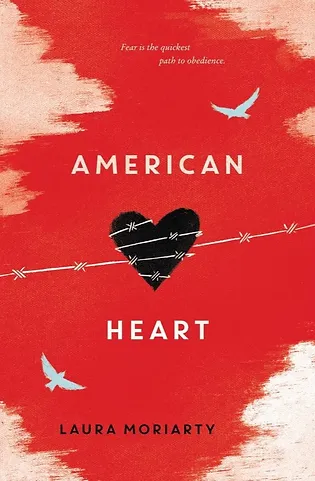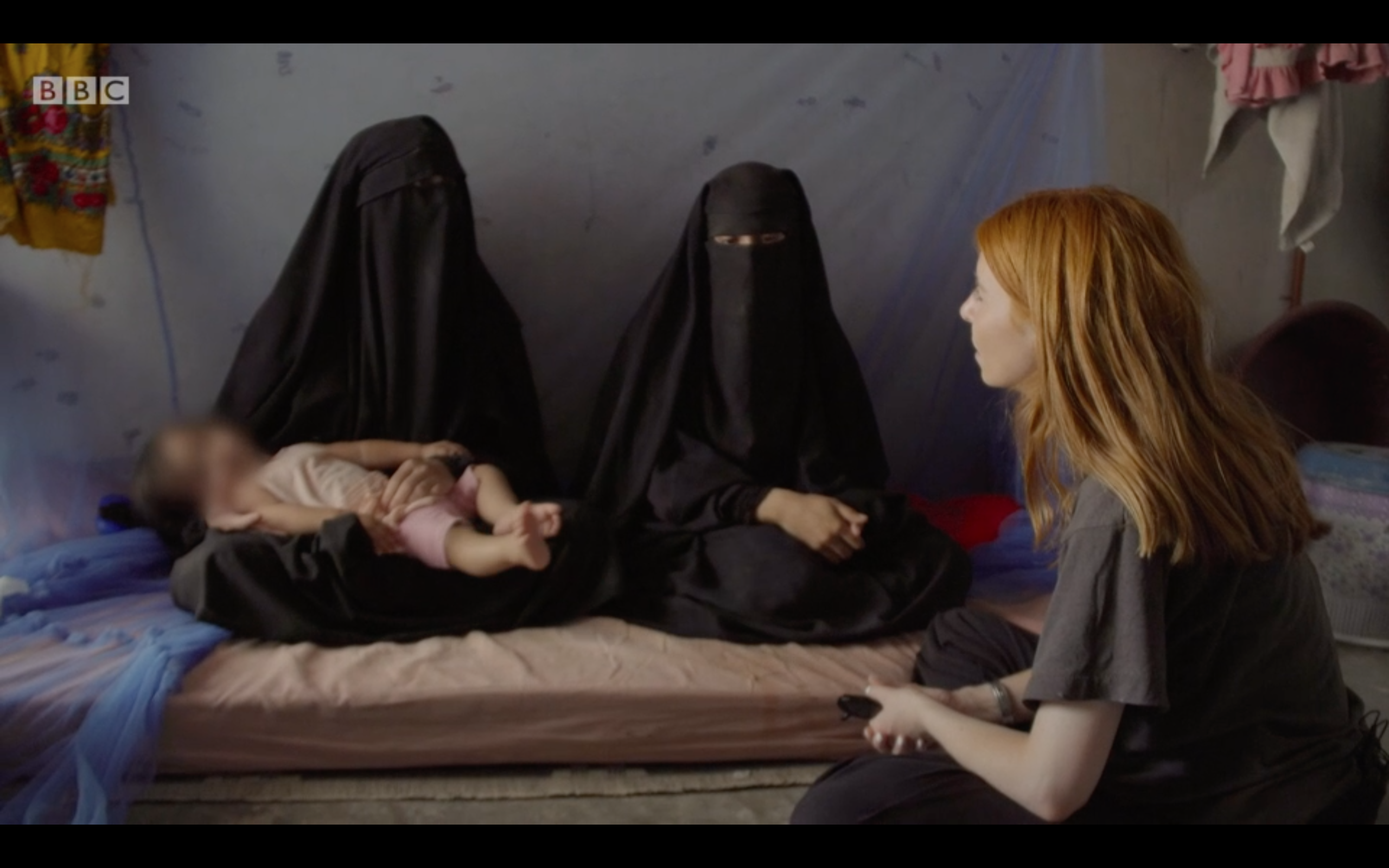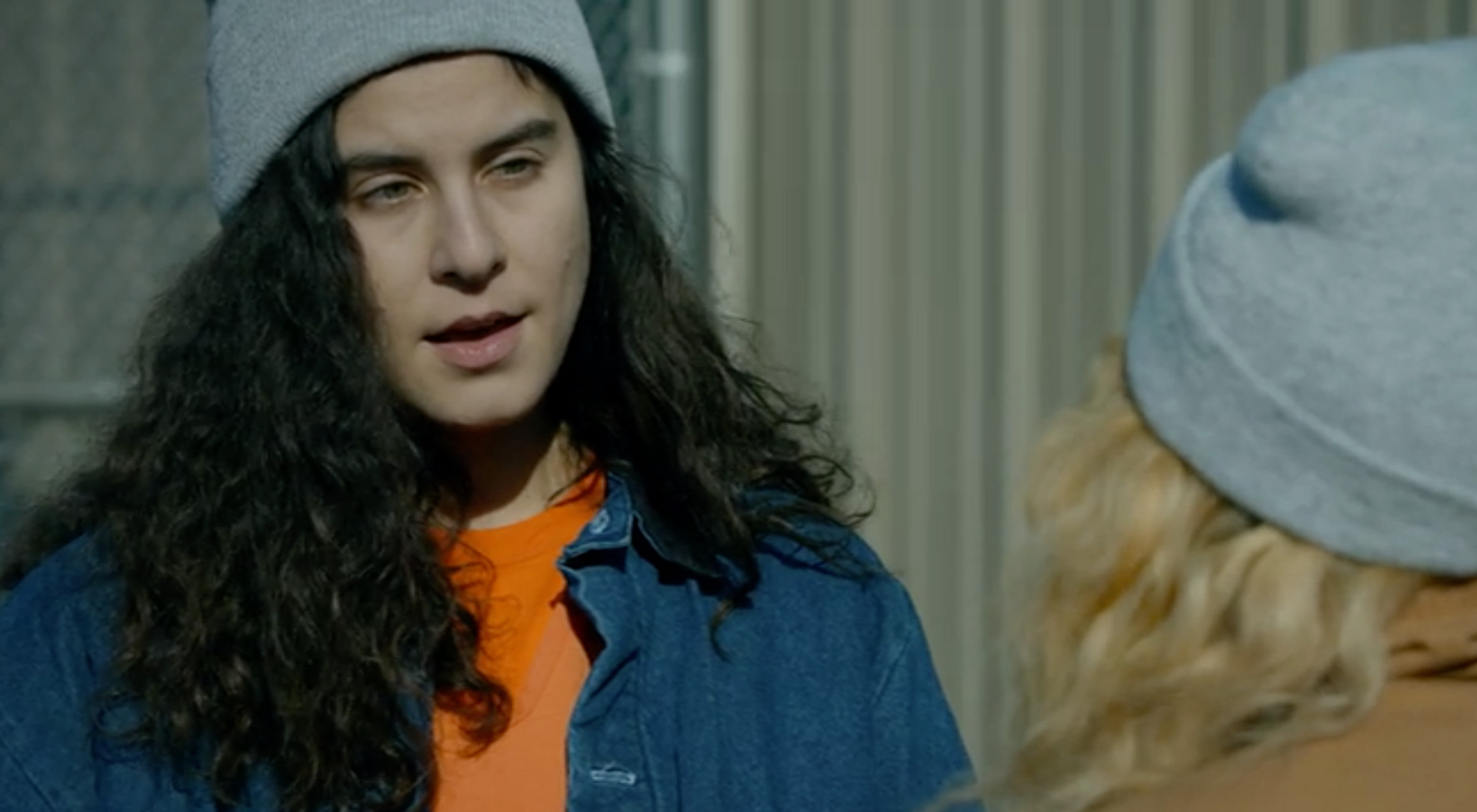Novel, by Laura Moriarty, published by HarperTeen (2018)
As Muslims across the US are being sent to camps in Nevada, 15-year-old Sarah-Mary comes across Iranian-American Sadaf who is on the run and trying to escape to Canada where her son and husband await her.
Sarah-Mary is reluctant, ignorant and unwilling to learn, yet, because of an unbreakable promise she made to her brother, she agrees to help Sadaf.

When Sarah-Mary first meets and interrogates Sadaf, Sadaf doesn’t speak, instead communicating through nods. This sets the precedent and power dynamic for the entire novel, despite the fact that Sadaf speaks perfect English, is an electrical engineer, a professor, has a PhD, is well-travelled, and about twice Sarah-Mary’s age.Author Laura Moriarty stated in an interview that American Heart cannot be white saviourism, because Sadaf is more accomplished than Sarah-Mary. Always good to have that incorrectly explained to us. She says:“The only thing is that [Sadaf] cannot pass as a native speaker in the way Sarah-Mary can. And so that’s it. That’s the only thing that Sarah-Mary brings to her. But Sadaf brings so much to Sarah-Mary.”
Why, then, does Sarah-Mary continuously speak for Sadaf, why does every decision about travelling across America, the hows, the whats, the whens, why are all of these decisions made by a fifteen-year-old? And why is the highly-educated Sadaf willing to go along with the guesses of a child?
The answer: Sadaf is a literary tool to help Sarah-Mary become slightly less disagreeable. In what should be an exploration of socio-political norms and changes, the stakes of American Heart are simply: can Sadaf make Sarah-Mary less of an obnoxious Islamophobe? (More on that Islamophobia later.)
As if Sadaf doesn’t have enough on her plate, what with fleeing persecution, a detained sister, and a son she hasn’t seen in months.
Sarah-Mary is constantly reassuring Sadaf, bossing her around, talking for her, even interpreting what she believes Sadaf actually meant, all while bulldozing Sadaf with prejudice. She refuses to learn her real name and instead decides to call Chloe, because, “I didn’t feel so bad about what I was doing when I thought of her as Chloe, a nice Portuguese woman.”
When Sarah-Mary (which, by the by, is a much harder name than Sadaf) – having overcome her Islamophobia – tells Sadaf that she’s not a bad mum, Sadaf doesn’t find it ridiculous or patronizing or even small praise, she is floored and touched by it.
American Heart takes advantage of the persecution of Muslims and reframes it as a quirky road trip and learning experience for a white teen. If this had been a deliberate social commentary of how POC’s experiences are undermined and hijacked by white people, rather than a bildungsroman at the expense of Muslims, then American Heart would have been a work of genius. Instead, literature simply reflects life.
Perpetuating Islamophobia
Sarah-Mary is ignorant, so of course she will say ignorant things. She refers to Sadaf as “some Muslim woman,” she advises Iranians to change the name of their capital because Tehran sounds like terror, she (perplexingly) thinks Muslims can’t own cats. When Sadaf disapproves of soda, she thinks, “maybe it was some… kind of Muslim anti-soda thing.”
She is scared when Sadaf starts praying, she considers Muslims and Americans mutually exclusive, takes cheap Islamophobic shots and interrogates Sadaf about the actions of other Muslims.
So far, so believable… apart from the cat thing.
But Sarah-Mary’s ignorance is never rectified – in the latter chapters, she doesn’t reflect on the offensive and ignorant things she said and believed, or the emotional turmoil she put Sadaf through (in fact she sees herself as a hero), or the labour that she forced Sadaf to expend just to prove her humanity.
The only resolution readers are given to address Sarah-Mary’s past Islamophobic behavior is that, once her journey is over, she can finally stomach calling Sadaf by her real name. Where is the growth we were promised? Where is the rectification of previous beliefs that painted Sadaf, and Muslims in general, as non-American hypocritical, traitorous, violent misogynists (among other things)?
And it takes Sarah-Mary an excruciatingly long time to see Sadaf as anything more than a threat that she feels guilty for helping. “I was really stupid, anyway, helping a Muslim, when everyone knows they only pretend to be innocent until they do their damage.”
But she goes along with her promise to her brother, because at least with Sadaf in Canada, “There’d be one less Muslim down here.”
I got three-quarters through the novel and wondered when Sarah-Mary would stop being such a raging bigot. She talks about ‘Arabic’ men treating their wives like servants, like dogs, and describes a news report about, “how in this one Muslim country, if a girl had anything to do with sex before marriage, their fathers or brothers could kill them in front of everybody, and it wasn’t illegal.”
Over and again, vague associations are made between Muslims and violence, subjugation, anti-Semitism, and homophobia. As a Muslim, reading a novel that purports to warn against persecution, it was an exercise in reading your own dehumanization, while waiting (in vain) for those misconceptions to be redressed. Simply, the author was not only reckless and unthinking, but out of her depth.
Fifteen pages after being Islamophobic, Sarah-Mary is suddenly aghast that someone else is blasé about Muslims being detained. “She was talking about these raids like there was nothing sad about them,”
Pot, meet kettle.
White-centrism
But there is one event in American Heart that changes Sarah-Mary’s perspective.
No, it’s not Sadaf’s persistent education, not spending time with a Muslim who cares far too much about her, not witnessing her country brutalize an entire religion, not watching a bloodthirsty group attack Muslim families in hiding – none of this gets through to Sarah-Mary the way that watching a white American veteran be killed can. I suppose it’s a realistic take – bigots need to see someone who looks like them suffer in order to understand the gravity of dehumanization.
That this is Sarah-Mary’s formative turning point doesn’t just make her character more obnoxious – and, truly, I struggle to think of a hero as unlikeable as this teenager – but it is also a symptom of the author’s ignorance when it comes to writing about race, religion, and persecution.
All the problematic issues in American Heart stem from the fact that this story about Islamophobia focuses almost entirely on its effect on a non-Muslim American. Yes, you will be vilified if you write a Muslim protagonist that is unbelievable or who falls short, or who reinforces stereotypes, but to write about Muslim suffering as being an experience for a white girl is far worse.
And although I would prefer Muslim protagonists to be written by Muslims, or people who have a long understanding of what Muslim communities face, not authors looking for jump on a bandwagon, there is no rule that says you cannot write about cultures and religions outside of your own – but you must do your research.
American Heart is a lazy attempt at jumping on that Muslim persecution bandwagon, without doing any of the leg work.
Why do we care what Sarah-Mary thinks of Muslim persecution? Why is she the protagonist in this story? When will she be out of my life, please God?
When Muslims are being mobbed and detained her concern is her own feelings, “I didn’t want to see the Muslims come out. I didn’t want to see their faces and think of Chloe.”
When Sadaf talks about studies that prove the racial profiling of black people, all Sarah-Mary can do is be offensively obnoxious: “oh my God, or oh my Allah, everybody better just bow down and accept it as truth.”
When Sadaf tries to spare Sarah-Mary from the legal repercussions of helping her, Sarah-Mary is insulted. When Sadaf is concerned about her taking a walk at night, she replies, “Probably a lot safer than walking around with you… Maybe in Iran a girl couldn’t go for a walk in the dark.”
Yes, she is a self-centered teenager, but the author is not. Is Sarah-Mary’s age any excuse to omit Muslims’ experiences from a novel about Muslim persecution?
And when, finally, Sarah-Mary gets past her prejudice, she can still only accept Sadaf when she frames her as American. Be sure to swallow that coffee before reading on:
“I knew part of her was Iranian, and would always be. But she had an American heart.”
Sadaf, the Iranian engineer is only palatable when she is Chloe, with the American heart.
It gets worse. Sarah Mary, better for the experience of her road trip, resolves to give her uptight Baptist school another shot. “I’d seen someone killed for real. I could handle a little persecution.”
Sarah-Mary has learned nothing, but at least she got some street cred for seeing a person die. And those Muslims in camps? She can relate to that, because she’s persecuted by detention, don’t you know?
Unbelievable Muslim
I really would love my grievances with this novel to end here. But we’re yet to deal with the writing of Sadaf, who, as we’ve already seen, cares far too much about an ignorant Islamophobe. But she also spouts patriotic nonsense about America, and honestly, I’ve had enough. Why do stars and stripes have to ruin everything, even the only Muslim character in this plague of a novel?
Are we supposed to believe that an educated, hijab-wearing Muslim would say of her own sister: “She registered. She did everything she was supposed to do and now here whole family are in Nevada (camps)…along with all my Muslim friends, including those who never wore the hijab in this country.”
Pro tip: if you write a character with a culture or religion different to your own, don’t have them spout your beliefs. An actual hijab-wearing Muslim wouldn’t classify those who wear the hijab as more worthy of punishment than those who don’t.
At the moment that (spoiler alert) Sadaf is about to be reunited with her husband and son, about to leave the country that turned her into a fugitive, she chooses to linger in order to tell Sarah-Mary, “Because it is a very good heart you have… you are one of my favourite Americans. And if that sounds like low praise under the circumstance, I can tell you, it isn’t.” Sadaf picks up a rock from the ground. “I took it so I could take some of America with me, a souvenir, because there is so much I will miss about this country.”
Ladies and gentlemen, we give you, the acceptable Muslim, the one who, maybe, doesn’t deserve to be in a camp with the rest of those hijab-wearing, barbaric animals.
American Heart receives four bloodied swords for portraying Muslims as violent and controlling, for its lack of research, for its unbelievable and disempowered portrayal of Sadaf and for believing its presentation of Muslims to be nuanced.
It has also inspired further categories of classification which will come into effect on this blog’s first anniversary, when reviews will be rated out of 10. Watch this space.



